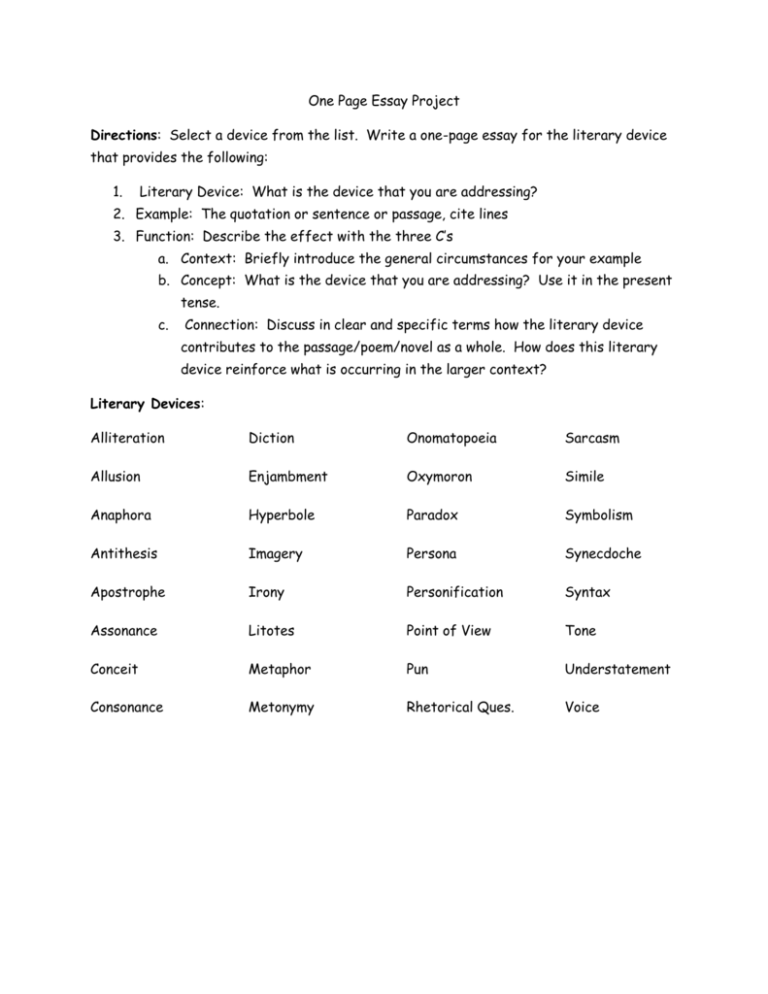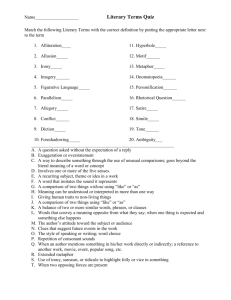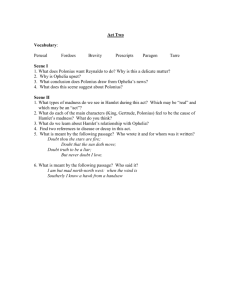One Page Essay Project
advertisement

One Page Essay Project Directions: Select a device from the list. Write a one-page essay for the literary device that provides the following: 1. Literary Device: What is the device that you are addressing? 2. Example: The quotation or sentence or passage, cite lines 3. Function: Describe the effect with the three C’s a. Context: Briefly introduce the general circumstances for your example b. Concept: What is the device that you are addressing? Use it in the present tense. c. Connection: Discuss in clear and specific terms how the literary device contributes to the passage/poem/novel as a whole. How does this literary device reinforce what is occurring in the larger context? Literary Devices: Alliteration Diction Onomatopoeia Sarcasm Allusion Enjambment Oxymoron Simile Anaphora Hyperbole Paradox Symbolism Antithesis Imagery Persona Synecdoche Apostrophe Irony Personification Syntax Assonance Litotes Point of View Tone Conceit Metaphor Pun Understatement Consonance Metonymy Rhetorical Ques. Voice Example: 1. Device: Irony: a contrast or discrepancy between what is said and what is meant, or between what happens and what is expected to happen. 2. Example: “Therefore, since brevity is the soul of wit…” (2.2.97) 3. Function: Context: Polonius, who believes that he has discovered the cause of Hamlet’s madness, approaches the king and queen with his news. He promises he will be brief in his exploration of Hamlet’s mental state. However, in his desire to impress the royal couple, he uses an arsenal of words and takes several lines to get to the point of Hamlet’s madness. He takes so long to get to his point that the queen implores him to use “less art” and get to the point. Concept: The irony is found in the fact that although he proclaims “brevity” to be the very “soul of wit” he is anything but brief. Connection: The irony serves a number of purposes. First, it shows that Polonius is perhaps not as clever as he or the king thinks he is; a fact that is borne out later in the play when one of Polonius’ clever ideas ends up getting him killed. The irony also serves to reveal Polonius’ loyalty to the king and queen; he may wish to make his statement brief in compliance with the queen’s wishes, but he must be certain to give every piece of information that he has even if it may not be directly relevant. Finally, it reveals the weakness of Claudius by showing his own lack of judgment. Polonius is too foolish to see that he does not even follow his own dictums, and Claudius has chosen this fool as his top advisor.





